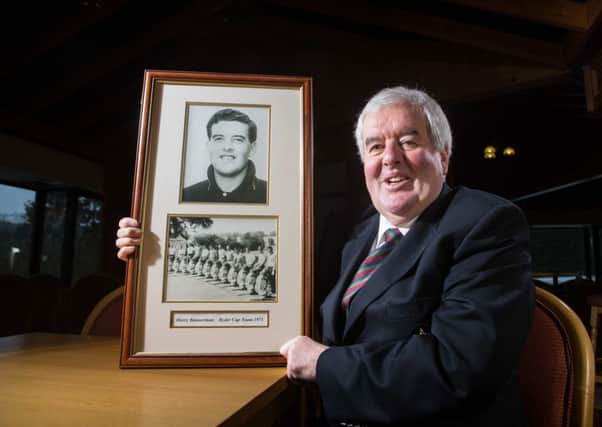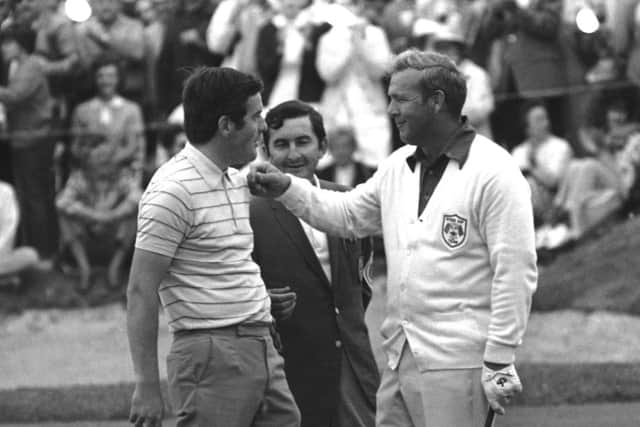Harry Bannerman, the economy-class Ryder Cup star


Welcome to September 1971. And the Ryder Cup matches at the Old Warson Country Club in St Louis, Missouri. Making up one twelfth of the Great Britain side and fresh from a fifth-place finish on the Order of Merit is 29-year-old Aberdonian Harry Bannerman. With two other Scots, Bernard Gallacher and Brian Barnes, and a major champion, Tony Jacklin, in the squad led by Bathgate native Eric Brown, hopes were high(ish) that GB could go one better than the iconic draw with the Americans at Royal Birkdale two years before.
That sounds nice. But it would have had to be achieved at minimum cost. The Professional Golfers Association – in charge of the biennial contest back then – wasn’t exactly living up to the “P” in its name. The days of Concorde, cashmere sweaters and all-round five-star treatment for the players were still some way off, a fact that became obvious when the team – minus the flying “feardie” that was Neil Coles – gathered at Gatwick Airport.
Advertisement
Hide AdAdvertisement
Hide Ad“We flew to St Louis via Ottawa (!) on British Caledonian,” remembers Bannerman, now retired but still a regular golfer in the Aberdeen area, especially at his “home” club of Banchory. “And it was economy all the way.”


Things didn’t get much better for most of the side upon their eventual arrival either.
“To the consternation of our captain, there was a chauffeur-driven, air-conditioned limousine waiting at the airport for one of our players,” continues Bannerman. “Namely, Tony Jacklin. I was left sweating like a pig trying to load my gear on to the bus laid on for the rest of us. Then we had to unload it all when we got to the hotel. Not exactly the welcome we were expecting. Nor, needless to say, was it anything like the treatment players get at modern Ryder Cups.
“The gear we got was hardly luxurious. I do recall being handed an envelope containing $500. But most of that went to my caddie. And there were other out-of-pocket expenses. I’m sure I made a financial loss on the week.”
Maybe, but the on-course events are ones the cigar-chomping extrovert has never forgotten. For Bannerman, in a career blighted by long-term back problems that eventually led to major surgery in 1978, the 19th Ryder Cup was to prove the archetypal once-in-a-lifetime experience. Never mind that the visiting side would lose by five points, 18½ to 13½.
From his five matches, Bannerman emerged with an honourable two-and-a-half points. In his two singles, Bannerman halved with the great Arnold Palmer, then defeated Gardner Dickinson. Indeed, even his losses were creditable. In tandem with Englishman Peter Townsend, the two-times Scottish Professional champion hunted Palmer and a promising youngster by the name of Nicklaus all the way to the last green on the second day.
“I played a lot of bridge with Peter Townsend that week,” says Bannerman, who is soon to be 72 – “level fours”. “We couldn’t hit balls because there was no range. It was just awful really. Not that it seemed to make much difference. On the second afternoon, Peter and I covered the opening nine holes in 29 shots against Arnold and Jack and were only one up.
“We were all square playing the last. I made a par four. Peter had a long putt for a birdie. Arnold was in his pocket. And Jack was maybe 35 feet away in two shots. After Peter missed, we were standing watching Jack. ‘You don’t think he’s going to hole this do you?’ he said to me. But I thought he would. And halfway there, I knew I was right. When the ball fell in, Jack jumped at least a foot into the air. And there was a huge roar. It was very exciting. We had maybe 10,000 people watching.”
Advertisement
Hide AdAdvertisement
Hide AdDespite that relative success, the fact that Bannerman was paired with Townsend was somewhat perplexing. One day earlier, he had linked up with compatriot Bernard Gallacher to beat the rotund team of Billy Casper and Miller Barber by 2&1.
“Eric Brown did everything his own way,” says Bannerman with a smile. “For example, he never asked any of us who we wanted to play with, or who we didn’t want to play with. I remember Peter Oosterhuis pleading with him to keep Bernard and I together after we won on the first day. But he broke us up and we never played together again. I never did get to know why.
“I learned a lot about Bernard in that match, though. As we walked off the first tee, he turned and loudly said, ‘Harry, if we cannae beat these two fat guys we need to chuck it’. He wanted them to hear him and he wanted me to believe we could win.
“At the short third, I put our tee-shot in a bunker and Bernard splashed out to maybe five feet. As the Americans were lining up their putt, he walked up to me and, nose-to-nose, he told me to start thinking about holing my putt for the half. ‘Casper won’t hole this one,’ he said.
“After Billy lipped out, I did hole mine. A bit nervously, but it went in. I ran after Bernard to give him the ball for the next tee-shot. At first, he just stared at me. Then he spoke. ‘I hope you’re not looking for praise,’ he said. That told me so much about how competitive Bernard was.”
For all that, the definite highlight of Bannerman’s week was his encounter with Palmer.
“Arnold was always my hero,” he says. “To play him was a pleasure. He birdied three of the first four holes and was two up. But I got it back to square by the turn. I was playing great and hit a lot of really good iron shots. On the last tee I was one up. At which point a member of the PGA appeared from the crowd. He was a bit excited and told me: ‘Harry, you’re a star!’
“That was nice but not quite what I needed to hear at that moment. I hooked my drive into the rough. Now, am I looking for an excuse? Not really. But hearing what he said didn’t help. Eventually I had a five-foot putt to win and I missed. That was disappointing. Arnold was a wee bit past his peak, but not much. It would have been a great scalp.”
Advertisement
Hide AdAdvertisement
Hide AdThese days, Bannerman views the Ryder Cup from a distance. And, like everyone else, he marvels at both the scale of the event and the fact that the previously all-but-invincible Americans are so regularly beaten.
“It’s amazing how the Ryder Cup has gone,” he reflects. “Bringing in the Europeans was a great thing and had to happen. We couldn’t compete otherwise. Back in ’71 there was definitely an inferiority complex in maybe two-thirds of the team. And Jacklin got a bollocking for separating himself from the rest of us. I think he learned from that when he was captain himself. Anyway, how much we thought about winning varied from individual to individual. I am one who relishes a good battle, though. I was up for it.”
Indeed, he sounds like he still is. Calling captain McGinley…